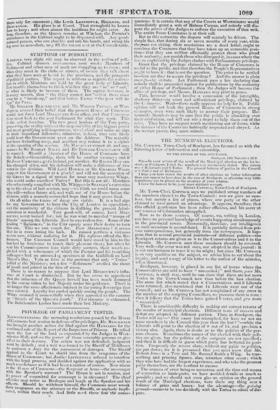PRIVILEGE OF PARLIAMENT TESTED.
Norwrrusrsxnusn the menacing resolutions passed by the House of Commons last session in defence of its privileges, Mr. STOCKDALE has brought another action for libel against the Hs:is:Inns for the continued sale of the Report of the Inspectors of Prisons. He relied upon the law of' the land as expounded by the Judges in West- minster Its11, and on the power of those venerable persons to give etfect to their decrees. The action was not defended; judgment went by default; and a writ was issued to the Sheriff of Middlesex to summon a Jury for the assessment of damages. The Sheriff applied to the Court to shield hint front the vengeance of the house of Commons ; but Justice Letersn o %LE refused to interfere with the lead process, and decided against the application with as much nonegtionee as Wit had beell a motion of course. Now where is the House of Commons—the Sergeant at Arms—the messenger with the Speaker's warrant ? The House is not in session, and its power of committal for contempt is ill abeyance! The chief Wender may retire to Boulogne and laugh at the Speaker and his °ffisess. Should he withdraw himself, the Commons must wreak their vengeance on the attorney or the Sheriffs, or anybody impli- cated, within their reach. And little need these 'fear the conses queares: it is certain that any of the Courts at Westminster Would immediately grant a writ of Habeas Corpus, and nobody will dis- pute the power of the Judges to enforce the execution of that writ. The entire Posse Comitatus is at their call.
But to this extremity the dispute will scarcely be driven. The simple fact, that during six or seven months of every year, while theybare not sitting, their resolutions are a dead letter, ought to convince the Commons that they have taken up an untenable posi- tion— that they can neither effectually protect those who plead their authority, nor punish those who disregard it, in cases where the law as explained by the Judges clashes with Parliamentary privilege.• Grant that the privilege claimed by the House of Commons is useful to the public, and that therefore the People's Representatives me.:Th t to have it : that is not the question. The point to be settled is—how are they to secure the privilege? And the answer is plain energh—by statute. Let Parliament pass a law declaring that nobody shall be proceeded against for publications by the authority of' either House of Parliament ; then the Judges will become the allies of privilege, and Messrs. HeNsAnn may print in peace. This, however. would involve a concession of the intangible, shadowy thing—in .erent and self-existent privilege, claimed by the Commons. Weil—there really appears no help for it. Public opinion will not bock the present House of Commons in strong theasure3, even were such likely to answer their purpose. HO-. nonrable Members may be sure that the public is chuckling over their mistbrtune, and will not stir a finger to help them out of the moire. They have no support worth mentioning out of doors, while the decrees of the Courts are habitually respected and obeyed. As the weaker power, they must submit.


























 Previous page
Previous page